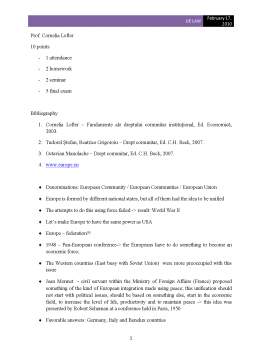Extras din curs
• Denominations: European Community / European Communities / European Union
• Europe is formed by different national states, but all of them had the idea to be unified
• The attempts to do this using force failed -> result: World War II
• Let’s make Europe to have the same power as USA
• Europe – federation?!
• 1948 – Pan-European conference-> the Europeans have to do something to become an economic force;
• The Western countries (East busy with Soviet Union) were more preoccupied with this issue
• Jean Monnet - civil servant within the Ministry of Foreign Affairs (France) proposed something of the kind of European integration made using peace; this unification should not start with political issues, should be based on something else, start in the economic field, to increase the level of life, productivity and to maintain peace -> this idea was presented by Robert Schuman at a conference held in Paris, 1950
• Favorable answers: Germany, Italy and Benelux countries
• 1951, Paris - Treaty establishing an European Community of Coal and Steel (this 6 countries)
• Jean Monnet said that this unification had to be done step by step, in each economic field and in the end, the countries involved will be so well integrated that they will find themselves to be part of a state, of unified form
• From economic cooperation they can go further, until reach the political cooperation (at this level, an actual state is created)
• This treaty established as proof that the cooperation between European states can be done peacefully because it was used a treaty, meaning a juridical act of international public law, known by everybody for more than 2000 years and used within the time; this juridical act was used to create a new international organization having as main object the activity the economic cooperation of member states within a particular field
• At the time, they were many other international organizations; what is new with ECCS – the members have to work together to become a community
• This new international organization obtained particular institutions that had within their activity to achieve the treaty objectives
• The institutions proposed and created were:
1. General Assembly (formed by representatives of member states from Parliament; empowered to represent the will of European nations and their citizens, and had for that a consultation role); CONSULTATIVE
2. Council of ECCS ( formed by representatives of the governments of member states, empowered to represent the will of the governments of the member states and having also a consultation role); CONSULTATIVE
3. High Authority (formed by specialists in the field of community, whose independence is beyond any doubt; it had a legislative and an executive role at the same time); LEGISLATIVE + EXECUTIVE
4. Court of Justice of the ECSS (formed by jurist specialists whose independence is beyond any doubt, empowered to do the following things: to interpret the community law and to solve the litigations that may occur through the application of community law, between member states and institutions, citizens and institutions etc) JUDICIAL
Preview document
Conținut arhivă zip
- 1.doc
- 10.doc
- 11.doc
- 2.doc
- 3.doc
- 4.doc
- 5.doc
- 6.doc
- 7.doc
- 8.doc
- 9.doc




























































